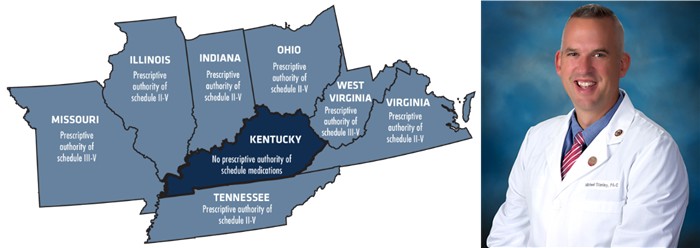
Left - Snapshot of our surrounding states with levels of schedule substances PAs are allowed to prescribe. Right - Michael Stanley, DHSc, PA-C
Michael Stanley, PA-C practices Emergency Medicine at TJ Samson Hospital in Glasgow, KY.
He represents the Western District on the KAPA Board of Directors and serves as the Chair for Legislative Affairs.
He is a 2000 graduate of the University of Kentucky PA program and in 2017 completed his doctoral degree in health sciences from AT Still University.
Dr Stanley is also a reserve officer in the United States Coast Guard with 24 years of active duty and reserve service.
He is married to Maggie, a nurse midwife, and together they have four children and four dogs.
Op-Ed by Michael Stanley, DHSc, PA-C
A diabetic person with burning leg and foot pain waits for days to see a physician in his rural county. A cancer patient receiving chemotherapy waits for anti-diarrhea medicine so she can comfortably rest. A veteran in the emergency room suffering from PTSD flashbacks waits for hours to receive anti-anxiety medication. A young adult with an opioid addiction desperately seeking help kicking his habit cannot find a health care provider to help him.
We see these medical situations happen too frequently across our state as we struggle with a shortage of health care providers. Kentucky patients suffer from common medical ailments and injuries that occasionally require a controlled substance medication, and physician assistants (PAs) are both educated and trained to prescribe them. Unfortunately, under Kentucky’s current law, PAs are helpless in these situations although they are fully trained and prepared to address them.
House Bill (HB) 93, sponsored by Rep. Daniel Elliott (R-Danville), streamlines access to health care in Kentucky. The bill would allow physicians who supervise PAs to delegate limited prescriptive authority for non-narcotic Schedule IIs and all Schedule III-V medications. House Bill 93 keeps physicians in control while providing expanded access to care for suffering Kentucky patients.
The Kentucky Primary Care Association (KPCA) summed it up best in a Feb. 5, 2019 letter to Kentucky’s House Health and Family Services Committee Chairperson, Rep. Kim Moser. “HB 93 is, we believe, an important step in meeting the needs of the medically underserved patients in areas of our Commonwealth. Kentucky produces a substantial number of physician assistants who have shown a preference in working in rural and underserved areas. However, the restrictions imposed on their full training and capability drive many to work in other states. Limited prescriptive authority for physician assistants will complement and enhance the ability of their supervising physician to provide needed services. HB 93 contains numerous safeguards and limitations related to training, supervision, and registration with the DEA and KASPER. There are also thoughtful limitations on prescriptive authority that make for good public policy and prudent protection for the public.”
I agree with KPCA’s assessment. PAs have been trusted members of the health care provider network in Kentucky for over 40 years. The collaborative agreement between PAs and their supervising physician is the backbone of our practice act and HB 93. In HB 93, we are advocating for full oversight of the prescriptive process from a PA’s supervising physician, the Kentucky Board of Medical Licensure (KBML), and the Federal Drug Enforcement Agency (DEA).
House Bill 93 bill is smart, safe, and supervised. Kentucky cannot remain the only state in the nation that does not allow PAs to prescribe some level of controlled substances. As we strive to become a world leader in economic development, we must first address the needs of our workforce. Access to health care is essential for the growth of our state and we must use every tool at our disposal to help our citizens.
Michael Stanley, DHSc, PA-C
Government Affairs Chair, Kentucky Academy of Physician Assistants (KAPA)
Glasgow, KY
***
The Kentucky Academy of Physician Assistants (KAPA) serves the needs of PAs and PA students who work or reside in the state of Kentucky. As the voice and advocate of PAs in Kentucky, KAPA promotes continuing education for its members, provides PA employment information to PAs and physicians, and strengthens the role of PAs by supporting and encouraging membership in KAPA. Visit www.kentuckypa.org for more information.